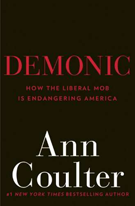
 In her latest book, Demonic, Ann Coulter describes the liberal “mob.” Gustave Le Bon’s 1896 book, The Crowd: A Study of the Popular Mind provides a basis to her explanation of the mentality of mobs in general, and specifically, the liberal mob.
In her latest book, Demonic, Ann Coulter describes the liberal “mob.” Gustave Le Bon’s 1896 book, The Crowd: A Study of the Popular Mind provides a basis to her explanation of the mentality of mobs in general, and specifically, the liberal mob.
Of course, it would not be an Ann Coulter book without plenty of controversial statements. Coulter throws in many not-so-subtle digs that are sure to spark controversy. For example, in describing the Minutemen of the American Revolution, she writes:
“They were not a rabid mob, full of festering hatreds, ready to dash out and impale their fellow citizens. (And virtually none of these brave men under arms…were dating one another.)”
What’s the point of statements like these? The description of the Minutemen who lived hundreds of years ago could have easily gone without an allusion to the Don’t Ask, Don’t Tell repeal, but Coulter knows how to keep people talking about her.
As usual Coulter’s book will be torn apart for its frequent controversial statements, while the larger issues will be ignored. Not that it matters. Coulter loves being the center of attention, arguing with liberals about something she said or wrote.
But there is a larger issue being examined. One section of the book examines the difference between the American Revolution (inspired by intelligent men who had a plan) and the less successful French Revolution (inspired by an angry, violent mob). “To understand liberals, one must understand the French Revolution,” she writes.
The history lesson continues with her description of student protests in the 60s as well as the violent side of the Civil Rights Movement (she actually takes a jab at Martin Luther King Jr.—gasp!).
She finishes her book with what will probably be deemed as a call to arms.
“Republicans would do well to remember that George Washington sent troops to crush the Whiskey Rebellion. Abraham Lincoln used the U.S. military to squash racist—and Democrat-led—riots in New York City. This nation’s heroes knew what Louis XVI did not: A mob cannot be calmly reasoned with; it can only be smashed.”
Yes, we will be hearing about all the mean-spirited things Coulter writes in her book for weeks. But, I expect, that is just what she wanted.
Stephanie Wang is the editor of the Michigan Review. She is a member of the Student Free Press Association.
Like The College Fix on Facebook / Follow us on Twitter





Please join the conversation about our stories on Facebook, Twitter, Instagram, Reddit, MeWe, Rumble, Gab, Minds and Gettr.